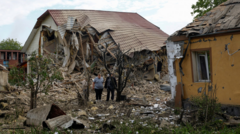Electoral contests in Romania and Poland exposed a fragile balance as mainstream parties held their ground against nationalist pressures, revealing underlying voter discontent that could reshape political landscapes ahead.
Centrist Resilience: Romania and Poland Avert Hard-Right Surge in Recent Elections

Centrist Resilience: Romania and Poland Avert Hard-Right Surge in Recent Elections
Unexpected victories for centrist candidates in Romania and Poland's presidential elections signal a temporary halt to nationalist advances in Eastern Europe.
In a pivotal moment for Eastern Europe, presidential elections held on Sunday in Romania and Poland showcased a surprising resilience from centrist candidates, effectively staving off the anticipated rise of hard-right nationalism that had concerned many liberal observers. Although nationalist forces have gained ground in recent years, the results marked a temporary retreat from this trend, reflecting a potential shift in voter sentiment.
Nicusor Dan, an independent mayor viewed as untainted by the corruption associated with the traditional political establishment, won a decisive victory in Romania's presidential runoff, defeating nationalist George Simion. Dan garnered an impressive 54 percent of the vote, buoyed by a remarkable voter turnout of 64 percent—a ten-point increase from the initial election round. This outcome defied expectations of a shift towards ultra-nationalism and demonstrated a preference among voters for stability and integrity in governance.
Meanwhile, the elections in Poland revealed similar sentiments as the electorate aimed to express dissatisfaction with both the ruling party and the opposition, leading to a complex dynamic where neither nationalist nor centrist parties could claim a definitive consensus. The results elicited relief from mainstream political figures in Europe and from the European Union itself, as they celebrated the voters' choice for an open, prosperous region connected to a strong European core.
Despite the successes of centrist candidates, the persistent undercurrent of discontent towards established parties indicates that the political landscape in Eastern Europe remains fluid. The elections served as a reminder that while centrist ideals temporarily assert their dominance, the looming questions of how political loyalty and identity will evolve in the face of growing dissatisfaction are far from resolved. Political analysts suggest that forthcoming elections could once again pivot the conversation towards hard-right populism if mainstream parties do not address the root causes of voter disenchantment.





















